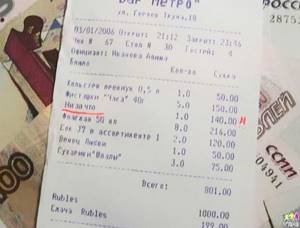How can you save money when purchasing healthy products? We talk in detail in our article.
Subscribe and read Express Newspaper in:
According to statistics, two-thirds of our country’s population spends more than half of their earnings in grocery stores every month. These expenses are quite understandable, because food is a basic need. And saving on food is not recommended: the diet must be balanced and complete, health is at stake. But it is still quite possible to reduce costs in this category, and without harm to the body.
War plan: strategy and tactics
- Before going to the store, eat a big, very big meal. You can convince yourself as much as you like that the feeling of hunger does not affect your mind, but British scientists know that a hungry person buys 15-20% more than a well-fed person.
- Take bags with you. This is a little thing that will save you the amount you can spend on dinner in a good restaurant over the course of a year.
- Never enter a store without a shopping list. All the marketers and merchandisers in the world are powerless against a buyer with a shopping list.
- Plan your menu. Making a menu shopping list automatically reduces food costs by 20-25% per month.
- Before going to the store, check what products you already have at home: in the refrigerator, in the freezer, on the shelves in the pantry, etc.
 You may be able to survive the winter with the supplies you already have. Don't buy what you already have.
You may be able to survive the winter with the supplies you already have. Don't buy what you already have. - Do not take children with you to the store. A child in a store will force you to voluntarily and compulsorily buy him something tasty. For example, if you go to the store 3 times a week and each time you buy something like a kinder surprise for your child (47 rubles), then you spend 7,332 rubles on this “trifle” per year.
- Before going to the store, determine the amount you are willing to spend. Just take it in cash. This way you won’t spend extra money, even if you really want to.
- The less often you go to the store, the less often you will spend money. Create a menu for the week and buy groceries once for the whole week. If you're a Master Yoda of menu planning, plan your menu for the month and buy food in bulk.
Method 6. Setting up our own production
We are, of course, talking about personal plots. This method will not suit everyone. I know people who categorically do not want to waste time in their garden beds. And I enjoy it. It’s especially nice when from April you stop buying greens, from June-July - cucumbers, tomatoes, peppers, cabbage and berries, and from August until the next harvest you have your own potatoes, carrots, onions and other vegetables on your table.
The fact that the savings are big is not even discussed. But the taste of vegetables and fruits grown on their own land surpasses the most beautiful products from the supermarket. I have never tried tomatoes and cucumbers as delicious as mine in a store. Perhaps residents of the southern regions are luckier and have better products in their stores. I live in central Russia - the zone of evergreen tomatoes.
But growing crops in apartments on window sills can be very disappointing and certainly will not lead to savings. The costs of good soil, ultraviolet light for 10–12 hours, and maintaining optimal temperature will cover all the benefits. And the taste may be completely far from expected. On the windows, plants are struggling for life - there is no time for sweetness and ripeness. There are some enthusiasts who have excellent harvests in their apartments, but these are only a few.
On enemy territory: shopping in a store
- When shopping, use a basket, not a cart. If you plan to buy a lot, then take a small cart rather than a large one. Subconsciously, your brain strives to fill the entire volume of the basket or cart, which means it will treacherously strive to buy more than it needs.
- In the store, don't look in departments you don't need. Even just for fun. Even if there is something shining there

- Washed vegetables are not only more expensive than unwashed ones, but they also store worse. Buy unwashed potatoes, carrots, beets, etc.
- Do not buy sliced foods (sausage, cheese, bread, etc.), they are more expensive than regular ones.
- Don't buy ready-made salads in the store. Prepare quick five-minute-two-kopeck salads at home: grated carrots with apple, cabbage with carrots, cucumbers with tomatoes, beets with green peas, etc.
- Buy domestic goods. They are often cheaper because the price does not include customs duties, shipping costs and other overhead costs. It's also patriotic.
- The most expensive products are placed on the shelf in front of the buyer. The second most expensive ones are on the shelf at hand level. Therefore, you need to start your selection from the lower or upper shelves, where the most inexpensive goods are located.
- Buy seasonal products: in the fall - beets, carrots, cabbage, potatoes, etc. In summer - cucumbers, tomatoes, zucchini, etc. Seasonal products grown on the ground under the sun are not only cheaper, but also healthier than those grown in greenhouses under lamps in a nutrient solution.
- Don't pay for advertising. Products from well-known manufacturers and brands are more expensive than little-known ones. Moreover, the latter are often not inferior to the former in quality.
- Hypermarkets and retail chains often produce products under their own brand, which are cheaper than analogues by eliminating intermediaries between the manufacturer and the store.
- The cheapest time to buy food at markets is on a weekday evening. And the most unfavorable time and the most expensive prices are weekend mornings.
- You can and even need to bargain in the markets. Ask for a discount if you buy a lot. Ask for a discount if you repeatedly buy something from the same seller. Ask for a discount even if you promise to buy regularly from that seller in the future.
Statistics
According to Rosstat, Russians spend a third of their salaries on groceries. The national average in rubles is 17.5 thousand rubles monthly. However, statistics differ depending on the region. In terms of money, Muscovites spend the most on food: 31 thousand rubles per month - this is 25% of wages. Residents of Ingushetia spend the least amount of money - up to 9 thousand rubles. Only the share of expenses is greater than all expenses - 60%.
It is clear that there are economic reasons behind such a high share of food expenses. It is a fact that consumer inflation is outpacing disposable income growth. Despite this, saving on food is possible. Let's look at existing life hacks that will help you save money and balance your diet in general.
Cool head, warm heart and calculator in hands
- Go to the store with a calculator. Don't be afraid to seem boring. In the eyes of store employees, you will be a person who knows how to count their money. A very dangerous person

- When choosing a product, first look at its composition, then at the price, and only then at the packaging. Choose not what pleases the eye, but what pleases the calculator.
- Read labels, compare ingredients. The same product with the same composition can be sold under different brands at different prices.
- Read labels, compare weights. There is no point in paying for beautiful and large packaging. It is better to prefer a similar product that is 20% more expensive, but there is 50% more of it.
- Read labels and always check expiration dates. Perhaps the low cost or impressive discount on the product is precisely because the expiration date ends today or tomorrow? Take only those products whose expiration date will allow you to eat them on time.
- Pay attention to weight and displacement. Often a product is cheaper not because it has a truly competitive price, but because it has less volume or weight. For example, a pack of butter is not always 200 g, but often 190 or 180 g. And a carton of milk may not contain a liter, but 900, 930 or 950 ml. It's a small thing, but unpleasant.
- Sometimes it pays to buy in larger packages. For example, a kilogram of flour costs 40 rubles. A 2 kg. The same flour is already 78 rubles. This means that it is more profitable to take 2 kg.
- Sometimes it is more profitable to buy in a small package. This is not a mistake by the sellers, but a conscious calculation that you will automatically take a larger package because you will automatically consider it more profitable. Before purchasing, use the calculator to determine which packaging is more affordable. For example, 5 kg. sugar costs 250 rubles. A 1 kg. sugar - 48 rubles. So, it’s better to take 5 kg. sugar 1 kg. and thereby save 10 rubles.
- Round correctly. 1999 rubles is not a thousand rubles and kopecks. This is two thousand rubles without one kopeck.
- Read the list of ingredients on the labels: they are arranged in descending order of quantity in the total mass of the product. For example, if you take spices, then the first thing on the list should be the spice you are paying for, not salt. Thanks to this approach, you will get the most possible for your money.
Calculate how much your time is worth
To help yourself effectively save and save money while refraining from further spending, calculate how much an hour of your time is worth. For example, you earn 100 rubles per hour, i.e. 800 rubles for a full working day.
If you decide to buy that box of chocolates for 400 rubles, that means you’ll just flush half your working day down the toilet. And for that beautiful dress for 2400 rubles you will work 4 full days.
Those who work for themselves - businessmen, freelancers, contract workers - know very well the value of their time and understand how long they will have to work to afford lunch in a restaurant. It's time for you to know this too.
And instead of price tags in the store, substitute opening hours. Sobering.
Decisive battle near the cash register
31. Have you ever wondered why even in a half-empty store there are always queues of at least 2-3 people? It's simple: in front of the cash register there are shelves with various small items: candies, chocolates, napkins, chewing gum. While you are bored in line, your hands reach out for this bright little thing. Or your child will steal it from you (see point 6) Buy goods on the racks in front of the checkout only if they are on your list.
- Before checking out, take another look at what's in your cart. Remove from it what you did not intend to buy.
- Without leaving the cash register, check with your receipt to see if the seller has given you your purchases correctly. Is there any excess there? Are there any goods there that are not at the price indicated on the sales floor? A little trick to prevent such “mistakes” on the part of the seller: when greeting the seller, immediately ask him to punch the receipt for you. This will make him be more attentive, you never know, maybe you are from the tax office with an audit

- Pay in cash, not with a bank card. Spending virtual money is much easier than parting with real money.
Full dinner
Of course, with this lifestyle, it is the main meal of the day and looks more like lunch. Try not to let it be too late. If the husband, for example, comes home from work at 18.00, then the whole family can be invited to the table almost immediately. Try not to eat after 19.00 - many doctors and nutritionists are against this. For starters, you can offer borscht. For the second course, serve chicken with vegetables and salad. For the third - compote or tea. For dessert - homemade apple pie. And no store-bought sweets!
Promotions and discounts: trap or chance?
- Install an application on your phone that allows you to track discounts in nearby stores. For example, Edadil. Or use special sites that collect data on such discounts (enter “catalog of discounts in supermarkets in city N” into Google)
- Before going to the store and even before making a menu and shopping list, look at what promotions are running in the nearest stores. Create your menu and shopping list with this in mind.
- If the store you visit has a discount system, then take the card and use it every time you go shopping at that store.
- Having a discount card is not yet a reason to buy from the store that issued it. Buy only where you really get the best prices for the products you need.
- Do not buy promotions or discounts on products that were not on your list. You don't really need them. And if you need it in the future, then buy it in the future. Promotions and discounts are repeated all the time.
- Keep an eye on prices to be able to determine whether the discounts are real or whether the “discounted” item costs the same as before the promotion.
Every fruit has its time
Try to purchase a variety of fruits and vegetables in the appropriate season when the crop ripens. It is at this time that prices for such goods are lowest. Don't forget that many of these can be frozen and stored for many months without losing quality. Of course, in modern supermarkets you can buy the same apples and oranges at almost any time of the year, but in this case you will have to significantly overpay for the goods, not to mention the possible treatment of them with special preparations to increase their shelf life.
Victory is forged in the rear: we cook at home
- Collect a collection of economical recipes and include them in your menu.
- Study examples of economical menus, take them as a basis when creating your own.
- Subscribe to our savings newsletter. The best one is from the Menu of the Week. If you often buy bottled water, it will be more profitable for you to buy a water filter.
- Cook in large quantities and freeze (can) leftovers. For example, you can prepare a large volume of bolognese sauce. Some can be eaten immediately, and some can be frozen. It will be cheaper than buying it in small jars at the store.
- Try to fry less and bake more. This will not only save oil, but also reduce the calorie content of the dish.
- Record the cost of products. Compare prices in different stores. Yes, it's boring. But thanks to this, you will know which store has the best prices for the products you buy most often.
- To save money on meat dishes, do not cook the meat separately and the side dish separately. Give preference to “two-in-one” dishes (such as pilaf, casseroles), that is, combine meat with a side dish in one dish.
- In large cities, chain stores often offer free delivery of their products for the same price as in the store. This is advantageous in that you can leisurely compare all the products (by weight and composition) at home, choose the most profitable ones, and at the same time not waste time traveling and choosing in the store itself.
- Clean out your refrigerator regularly. Move foods that can be stored for a long time to the far corners. And there should be foods in sight that need to be eaten first. This is especially true for small products such as a piece of cheese, sausage, or cheese curds, which can get “lost” in the refrigerator and spoil.
- Take lunches with you to work. You don’t have to prepare it on purpose, but take part of breakfast or yesterday’s dinner.
- Freeze seasonal foods in the summer, when vegetables, fruits, herbs and berries cost pennies. In winter, these reserves will turn gold.
- Avoid shopping in convenience stores, buy in hypermarkets or small-scale grocery stores. The larger the store or chain of stores, the lower the markup they can charge. The lower the markup, the cheaper the products are for you.
- Buy in small wholesale - it's cheaper. Organize a joint purchase with your neighbors, friends, and relatives.
- Buy the fish whole and cut it yourself. From the head, fins and ridge you can cook broth for fish soup. You can make cutlets from the fillet, bake it in portions in the oven, salt it, etc.
- Buy a whole chicken and cut it up yourself like this. An example of reasonable savings or how many dishes can be prepared from one chicken is here.
- In autumn and spring, at agricultural fairs you can profitably buy potatoes, beets, carrots, cabbage, apples, etc.
- Greens are expensive in winter. And you can grow it on a windowsill in a city apartment for free.
- Do your food or prepared meals expire and you don’t have time to eat them? Don't throw it away - freeze it.
- Store perishable foods on a separate shelf in the refrigerator. This will help you remember to eat them first. By the way, it is coldest on the third shelf of the refrigerator (+2 °C) and warmest in the door and drawers (+8-10 °C).
- Try to reduce eating out to a minimum. Homemade food is almost always cheaper than food in restaurants and cafes.
- Before placing an order at a cafe or restaurant, carefully study the menu. Almost every establishment has the opportunity to have lunch/dinner inexpensively. These are set lunches (or business lunches), “2 for the price of one” promotions, special promotions for specific dishes, etc.
- Buying a bread machine is a good investment if you eat baked goods frequently. Homemade bread is about 20% cheaper than store-bought bread.
- Install one of the home accounting programs (applications) on your phone and computer and record all expenses for at least 3 months. This is the best way to find out where the money is going and how to keep it in your wallet.
- A summer day feeds all winter. Therefore, actively roll, pickle, salt, make jam, ferment in the summer to delight yourself in the winter.
- Experiment with inexpensive products. Millet porridge, barley pilaf, chicken heart goulash, vegetables with ribs, stuffed necks - how often do such inexpensive dishes appear on your table?
Considering the nuances
It will be important to consider the nature of work and study of your family members. That is, for example: the husband leaves for work at 9, the son goes to school at 8.30. You stay at home (work remotely on your computer). My son arrives at 2:30 p.m. My husband returns from work after 18.00 (ideally, he can pop home for a break in the middle of the day). Weekends for the whole family – Saturday and Sunday. What follows from the described data? Most likely, the main meal for the whole family (a kind of late lunch) will be after 18.00. A joint breakfast is possible - depending on the circumstances, it is hearty, but light enough so that after it the stomach does not put pressure on the eyes. Lunch for my son when he comes home from school and for my husband if he pops in for a snack (but again, not too loaded with calories). On Saturday, some kind of holiday dish is possible. As on Sunday (just try not to ruin all your savings efforts and make sure it’s tasty, but not too expensive).
Code of the penny-pincher
- Add wine vinegar and your favorite spices to the jar, where the mayonnaise remains only on the walls, and shake it well. Makes a salad dressing.
- Pour hot milk over the empty jar of Nutella and shake. Get hot chocolate.
- When oil or sauce bottles run low, turn them upside down to extract as much content as possible.
- Cut the plastic packaging, there is still a lot of tasty stuff on the walls.
- If you have the desire and opportunity, collect and dry/freeze mushrooms and berries yourself.
- Replace tea packaged in bags with loose leaf tea.
- Instead of tea, you can brew herbs. For example, fireweed, thyme, lemon balm, mint, currant and raspberry leaves and shoots, chamomile, linden.
- Try not to throw away food. You can make crackers or croutons from stale bread. From the cooled porridge - cutlets. Pancakes made from sour milk. From cottage cheese with an expiring shelf life - cheesecakes, etc.
- Small pieces of all sorts of things left in the refrigerator make excellent toppings for pizza and pies.
- Leftover fermented milk products can be used in this way.
- Tomato juice can be made from tomato paste.
- Homemade kvass is almost 3 times cheaper than store-bought kvass.
- Do not pour out the marinades from cucumbers and tomatoes. They can become the basis for pickles and borscht, and you can stew meat in them.
- The juice remaining after frying meat can become the basis for sauce. For example, tomato and sour cream for cabbage rolls.
- Add finely chopped vegetables with a neutral taste to the minced meat. For example, zucchini, cauliflower, onions. This trick will allow you to cook more cutlets from less meat, while the cutlets (meatballs, meatballs) will turn out more juicy and tasty.
- From shrimp shells you can prepare delicious shrimp oil according to the French recipe.
- Use the water in which the peeled potatoes were boiled to make soup. You can dilute mashed potatoes with the same water instead of milk.
Omelette
An excellent option for a complete, quick and inexpensive breakfast is the omelette king and all its various variations. Judge for yourself: vegetable oil and eggs are relatively inexpensive. You can add just a little bit of sausage for taste. Green onion. A drop of milk. And a gorgeous nutritious breakfast for the whole family is ready! You don't need to be a genius cook to prepare this dish. However, try to avoid frequent and daily repetitions in variations. You can cook it next time, for example, with cottage cheese. And today - with pieces of tomatoes. In general, an omelet is a universal food, because almost every time it can be cooked with any additives, giving the dish originality.
Ingredients for three people: 6-7 eggs, 100 grams of good boiled sausage or ham, a pinch of salt and soda, a large spoonful of milk, a spoonful of low-fat cottage cheese, a little vegetable oil for frying, fresh herbs for decoration.
- Beat eggs with milk, soda and salt.
- Finely chop the sausage into cubes and fry in vegetable oil in a frying pan.
- Pour the whipped mixture into the frying pan. Crumble cottage cheese on top.
- Cover with a lid (preferably transparent so that the process itself can be seen). We wait a few minutes without opening the lid. As soon as the omelette thickens and stops flowing, you can turn it off and serve, garnishing with chopped herbs. In this design it turns out tender and soft. Some people prefer to turn the omelette over and fry on both sides. But then he will become redder, but tougher.
- You can serve the omelet for breakfast with croutons made from day-old bread in the toaster. Wash it down: for children - milk, for husband - coffee or tea. And now, with peace of mind, you can send your household members to school and work.
Master of replacement and substitution
- Replace expensive meats with cheaper ones. Instead of beef - pork. Instead of turkey - chicken.
- In winter, instead of expensive “plastic” vegetables, fruits, and herbs, buy frozen, canned or dried ones that were collected and processed in the summer, fully ripe. Their nutritional value is comparable to that of fresh vegetables, fruits and herbs, and they are cheaper.
- How about offal instead of meat? From the liver, heart, stomachs, kidneys, etc. you can prepare many delicious dishes that will be cheaper than meat dishes. For example, heart is no worse than regular meat, but costs half as much. And the heart can make a good goulash, minced meat filling for casseroles, etc. And what a delicious filling for dumplings comes from a light one!
- Instead of expensive varieties of fish (salmon, trout, sea bream, etc.), buy inexpensive ones (hake, blue whiting, pollock, capelin, tilapia).
- Instead of bagged porridge, buy cereal. It's both healthier and cheaper.
- It is not at all necessary to eat meat for breakfast, lunch and dinner. Several days a week, meat can be replaced with other protein-rich and affordable foods: legumes or dairy.
- Save money on store-bought juices made from powdered concentrate. An exception may be tomato, apple and birch juices (in our latitudes they are often bottled in their original form). It is cheaper and healthier to cook compotes from fruits and berries frozen in the summer.
- If you do not live in a seaside city and are not sure that chilled fish splashed happily in the sea (lake) for just a couple of hours, then buy frozen fish. It is cheaper and not inferior in quality to the one thawed in the store and sold under the guise of “chilled”.
- To save money on meat dishes, cook dishes less often from pieces of meat (such as chops), and more often dishes from minced meat, to which you can add a lot of tasty, healthy and inexpensive things.
- Replace large plates with small ones. This simple tip will help you eat less.
Buy and eat more beans and whole grains
A diet containing whole grains is good for many reasons. First, grains are full of fiber, which helps you stay full longer. This leads to you eating less and, of course, buying less food.
Additionally, whole grains and beans provide essential nutrients that are removed from refined grains. These include vitamins B and E, iron and magnesium.
To save money while loading your diet with nutrients, buy brown rice, quinoa or buckwheat. And, as mentioned earlier, dried beans (although they require additional preparation) are a more economical choice than canned ones.
What can you do at home?
- Instead of snacks, fast food, and ready-made food, buy quality products and cook at home. This is not only more economical, but also healthier.
- Yogurts. You can make them yourself in a yogurt maker, in a slow cooker, or even in a regular saucepan.
- Many types of expensive cheeses can also be made at home. For example, Philadelphia, mascarpone.
- If you can buy whole milk, buy and prepare cottage cheese and cottage cheese at home according to this and this recipe.
- Make your own cookies and pies at home. Examples of inexpensive cookies here and here, jam pie here.
- Make homemade seasonings. For example, in the summer you can dry herbs and prepare a delicious dried seasoning like “vegeta”
- Homemade turkey or chicken sausages are even suitable for children's menus.
- Homemade sausages: boiled, liver, finger sausage, chicken, pork, liver, salmon.
- Prepare homemade salted or marinated fish.
And finally: saving is voluntary. Think of it not as a punishment, but as a sport that trains ingenuity, discipline and culinary skills.
What saving methods do you use?
Author of the text Daria Chernenko, website Menu of the week
Self-cooking
During lunch breaks at work or school, many people like to visit various fast food outlets, cafes, canteens, or simply buy fast food. This tip on how to save money on groceries is worth paying special attention to. If you carry out simple calculations and find out exactly how much money you spend even on an ordinary dining room, then the amount will not be the smallest.
Naturally, it is much more efficient to prepare food at home, pack it and take it with you. This way you will not only save a lot of money, but you will also eat healthier.
View expenses as an investment
In fact, everything you spend is an investment in your future. Learning to consciously save and save with this knowledge is easier.
A simple example. Many articles advise against takeaway coffee and business lunches (even I cited this as an unwise waste above). But if you need coffee to get into the mood for work and without it you will feel overwhelmed all day, you shouldn’t skimp on it! Instead, make drinking coffee a tradition.
The same goes for a business lunch. Perhaps eating prepared food (and in some cafes it is no worse in quality than homemade food) will significantly save you time. And you can earn more money than spending an extra two hours at the stove.
If a new suit will make you feel more confident and help you grow your career, you should buy it.
Think about whether your future purchase will help you? If this is food, will you be satisfied or are you just buying this stick of sausage for indulgence? If there are clothes, will you actually wear them or will they take up space in your wardrobe?
I do not encourage you to lead an ascetic lifestyle. On the contrary, saving should be conscious and should bring you joy. You must understand why you save and spend. And stop berating yourself for expenses.
And here’s another interesting article: Tinkoff Bank credit card: conditions, interest and my review
Every expense transaction is an investment in your future. A simple rule: if the purchase is useful and allows you to earn more, buy it. If not, refuse.
But don't relieve stress by shopping! Think about whether you really need this thing or are you just drowning out stress? It’s one thing to have a bottle of red a month to relieve stress, and another thing to have weekly get-togethers at the bar. Don't cross the line!
Car
The car solves many problems of a modern person, but at the same time it causes a lot of hassle and financial costs, from regular maintenance to repairs, replacement of parts and registration of an insurance policy, which also costs far from 100 rubles. So what can you save on?
- Minor breakdowns, malfunctions, defects. Many car owners, when the slightest scratch appears, rush to the coolest service station, look for the best specialists in their field and fix it for several thousand rubles; in addition, they will definitely be sold on wax polishing and all sorts of different and very “necessary” procedures for the car. We are not talking about total malfunctions when a professional is really needed. We are talking about little things that you can even figure out on your own if you want.
- Snack at a gas station. At every gas station there are shops, the assortment of which consists entirely of unhealthy goodies such as drinks, energy drinks, hot dogs, pizza, and chips. In this case, the driver’s mistake is often to go on business or to work on an empty stomach, after which he will definitely spend money on something unnecessary and unexpected. The way out of the situation is to eat at home or take a small brake with you.
- Tire condition – breakdown of the car or its individual parts, excessive fuel consumption can be caused by underinflated or overinflated tires. Watch this moment carefully.
 You may be able to survive the winter with the supplies you already have. Don't buy what you already have.
You may be able to survive the winter with the supplies you already have. Don't buy what you already have. 











